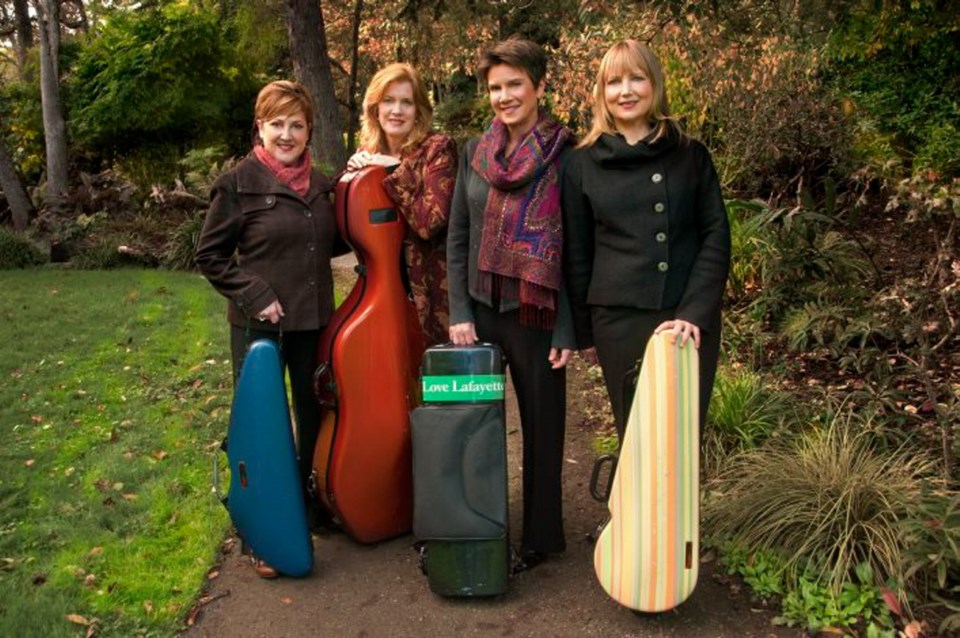What: Lafayette String Quartet
When: Tonight, 7:30
Where: Phillip T. Young Recital Hall, University of Victoria
Tickets: $35 (at vsmf.org)
Twenty-five years ago, the Lafayette String Quartet voted to move to Victoria by tearing up a cheque.
Back then, the American quartet divided its time between Detroit, where it was mostly based, and the Eastman School of Music in Rochester, New York. They had received word of a job opening at the University of Victoria, then seeking a resident string quartet.
They auditioned and were offered the job. But they still weren’t sure.
For violinists Sharon Stanis and Ann Elliott-Goldschmid, violist Joanna Hood and cellist Pamela Highbaugh Aloni, the offer was tempting — and rather exotic. They had jobs and lives in the U.S., husbands, boyfriends and fiancés to consider.
“We thought: ‘Oh, that’s too far,’ ” Stanis recalled this week.
Late one night, driving on tour between Pomona, California, and Santa Barbara, the four women decided to make a decision. Stanis pulled out a cheque, ripped it in four and gave each of her colleagues a piece of paper and a pencil.
They were instructed to write a plus sign for staying in the U.S. and a negative sign for moving to Victoria (“because Victoria was an unknown”). Stanis then collected the bits of paper and read the results. After three “minuses” she got to the final one.
“I said: ‘Hey guys, this is our future.’ And it was another minus. We went, ‘Ahhh!’ screaming in the car.”
That was 11:11 p.m. on the night of Jan. 11, 1991 (Stanis has a memory for such details). At the time, the Lafayette String Quartet had already been together five years.
Tonight, the LSQ launches its 30th season with a concert at UVic’s Phillip T. Young Recital Hall. It includes Haydn’s String Quartet in E Flat Major (the so-called “joke” quartet), Ravel’s String Quartet in F Major and Jean Coulthard’s String Quartet II (Threnody). The latter, a 25-minute work, is Coulthard’s expression of sorrow over war.
Whether you’re a married couple, a rock band or a classical quartet, three decades is an awfully long time to be together. Not surprisingly, Stanis said it’s a shared passion for music that has kept them together.
It’s not always easy. Their personalities are all different. Stanis comes from a Polish/Eastern European family in which the loudest voice held the floor. In the early days of the LSQ, she continued this way of communicating.
“I just thought if I wanted to get my point across, I had to yell it fortissimo and they’d understand,” she said with a laugh.
Over the years, Stanis has learned to temper herself. And, she said, her capacity for empathy has deepened.
“As much as I would like to say a whole bunch of things in rehearsal, there are times when I’ll just sit and listen.”
All string quartets have something that makes them unique. Stanis believes in the case of the LSQ, it’s their “very blended sound” — the ability to make four instruments come together as one voice. This, she said, reflects the influence of their mentor, Rostislav Dubinsky.
A former member of Russia’s famed Borodin Quartet, Dubinsky brought a lifetime of musical wisdom to coaching his disciples. In particular, he stressed the importance of arms bowing in unison at the same speed.
The quest for excellence has stayed with the LSQ. Stanis said they’ll typically finesse all aspects of a composition, whether it be merely mastering a downbeat or fine-tuning the buildup to a musical climax.
“We’ll spend anywhere from five to 25 minutes on a detail that the audience may or may not catch. But it’s important to us.”
With this in mind, Stanis and Elliott-Goldschmid travelled to Bloomington, Indiana, just to examine scores that belonged to the late Dubinsky from his days with the Borodin Quartet. These were Shostakovich string quartets — the pair wanted to study the bowings and fingerings their teacher had jotted in the margins.
It’s part of the preparation for an ambitious project the Lafayette String Quartet will undertake to mark their 30th season.
From Feb. 3 to 9, 2017, they will perform all 15 of Shostakovich’s string quartets consecutively at UVic.
It’s not often done. It’s not easy. Stanis believes it will be a pillar in her quartet’s three-decade career.
“It’s something I can’t wait to do,” she said.



